US petrol tops $3 per gallon, shortages spread amid pipeline saga
The Colonial Pipeline, the most important conduit for distributing petrol, diesel and jet fuel in the United States, went offline May 7 following a cyberattack, and its operating company expects to decide Wednesday whether to restart flows of oil products.
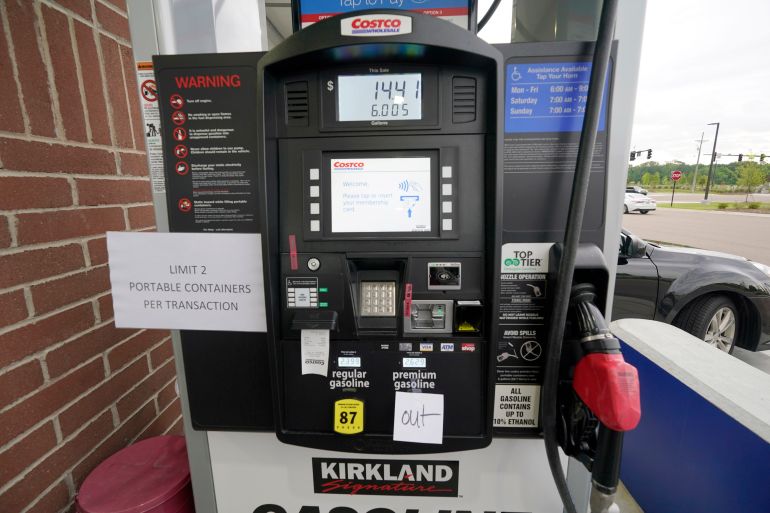
U.S. average gasoline prices exceeded $3 a gallon for the first time in more than six years amid growing shortages of fuel across the South and East while Colonial Pipeline remains out of action due to a cyberattack.
The national average retail price rose to $3.008, according to data from auto club AAA on Wednesday. The premium for wholesale gasoline in the New York area reached its widest in three months. The gains may add to broader inflationary pressures as commodity prices from timber to copper also surge.
Keep reading
list of 4 itemsFBI confirms cyberattack on US pipeline carried out by DarkSide
US pipeline still days away from operating after cyberattack
Shut US pipeline makes refiners seek storage on oil tankers
Colonial, the most important conduit for distributing gasoline, diesel and jet fuel in the U.S., went offline May 7. The pipeline’s operating company said it expects to make a decision Wednesday on whether to restart flows of oil products.
In the meantime, panicked motorists have prompted a run on filling stations in several states. In Spartanburg, South Carolina, 78% of outlets were out of gasoline, while Pensacola, Florida, and Charlotte, North Carolina, had 73% and 71% outage rates, respectively, according to data from retail tracker GasBuddy.
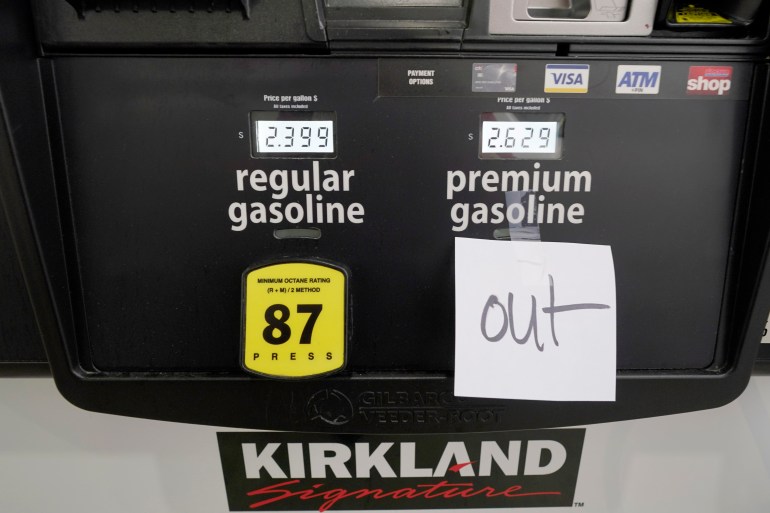
Frustration has grown among political leaders over scant details about when the pipeline will recover. U.S. Energy Secretary Jennifer Granholm said that even if Colonial can restart Wednesday, it’ll take days longer to “ramp up operations.”
The White House has announced several measures to blunt the growing crisis that threatens to hobble the post-pandemic economic recovery. The Biden administration will give a House briefing on the cyberattack at 6 p.m. Washington time.
“This is something that demands really serious federal attention,” Florida Governor Ron DeSantis said Tuesday, prior to declaring a state of emergency. “The U.S. government needs to be involved, they need to help mitigate this. My fear is, you have these gas shortages, it’s going to cause a lot of problems for people.”
Colonial connects Gulf Coast refineries to population centers from Atlanta to New York and beyond. Each day, it normally ships about 2.5 million barrels (105 million gallons), an amount that exceeds the entire oil consumption of Germany.
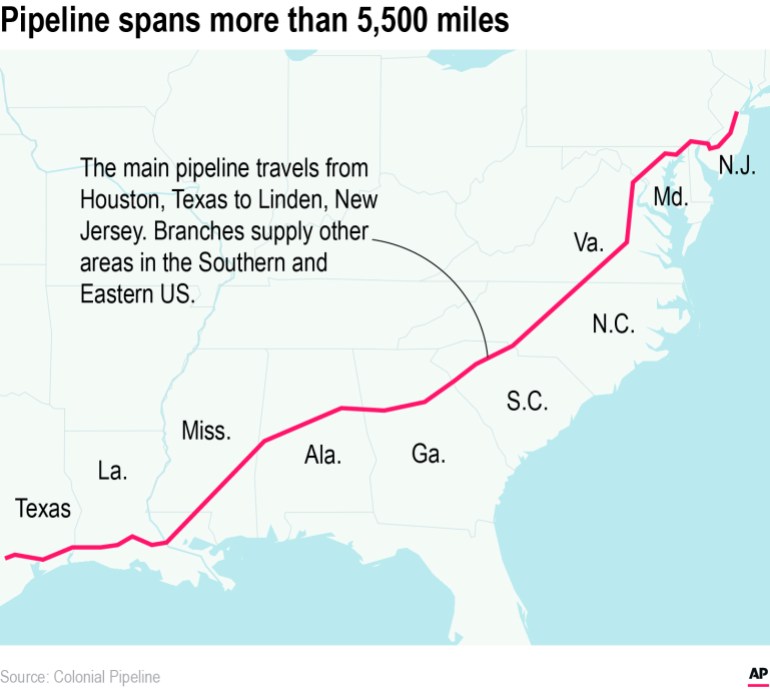
Even when the pipeline is restored to full service, it will take about two weeks for gasoline stored in Houston to reach East Coast filling stations, according to the most recent schedule sent to shippers. For diesel and jet fuel, the transit time is even longer — about 19 days — because they are heavier and move more slowly.
More than four days into the crisis, Colonial has only managed to restart a small segment of the pipeline as a stopgap measure.
Meanwhile, fuel shortages continued to worsen. In Atlanta, 20% of filling stations were dry by Tuesday afternoon, according to retail-fuel tracker GasBuddy.
Two of the nation’s largest truck-stop owners — Love’s Travel Stops & Country Stores Inc. and TravelCenters of America Inc. — confirmed that fuel is scarce is some states. Both companies said they’re taking extraordinary measures to replenish tanks.
The situation across the southeastern states is “rapidly deteriorating,” Brad Jenkins, a senior vice president at truck-stop owner Pilot, said in an email.
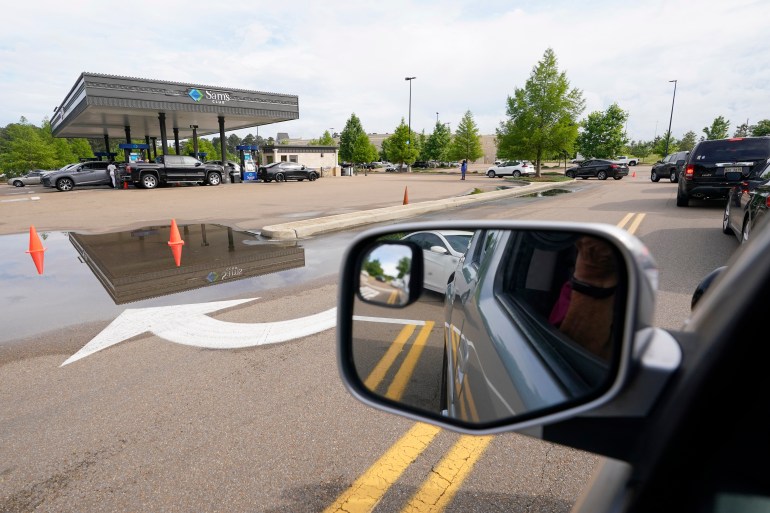
The Biden administration issued an order on Sunday extending the amount of time truck drivers can spend behind the wheel when transporting fuel across 17 states and the District of Columbia.
On Tuesday evening, the Transportation Department said 10 states could allow heavier-than-normal truck loads of gasoline and other fuels.
Federal transportation regulators also took the first step toward waiving the 101-year-old Jones Act that prohibits foreign-flagged and -staffed ships from hauling products from one U.S. port to another.
Fuel traders have so far redirected at least one international cargo of gasoline, and another of diesel, toward the U.S. East Coast, according to shipping data compiled by Bloomberg.
Gasoline isn’t the only oil-derived product under threat. In an effort to bolster jet-fuel inventories, Southwest Airlines Co. has begun flying supplies to Nashville, Tennessee, and other cities.
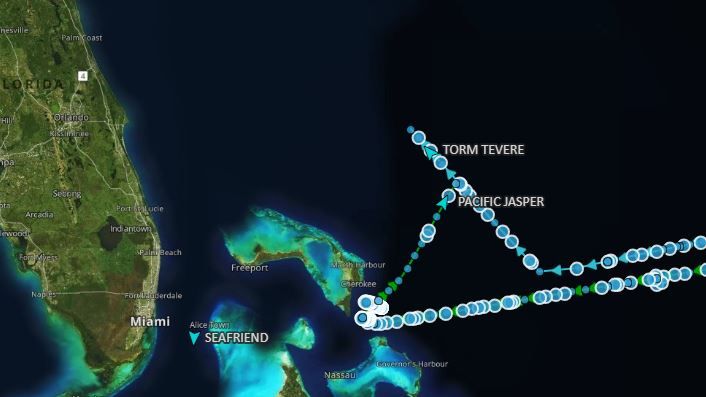
So far, no Southwest flights have been affected by the pipeline closure; rather, the airline said it’s “actively managing” fuel stockpiles.
United Airlines Holdings Inc. loaded extra fuel on flights to preserve local supplies in places like Baltimore and Greenville-Spartanburg, South Carolina.
The Environmental Protection Agency moved to allow the sale of gasoline that doesn’t satisfy requirements meant to help combat smog in certain areas. An initial order allowed the sale of conventional gasoline in areas where reformulated gasoline is required across Maryland, Pennsylvania, Virginia and the District of Columbia. A second order went further by waiving low-volatility requirements governing conventional and reformulated gasoline in those areas, as well as nine other states.
Emergency shipments of gasoline and diesel from Texas are already on the way to Atlanta and other southeastern cities via trucks, and at least two Gulf Coast refineries began trimming output amid expectations that supplies will begin backing up in the nation’s oil-refining nexus.